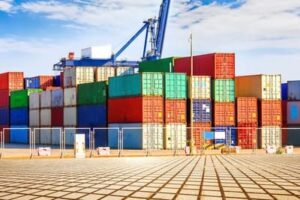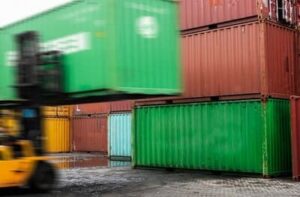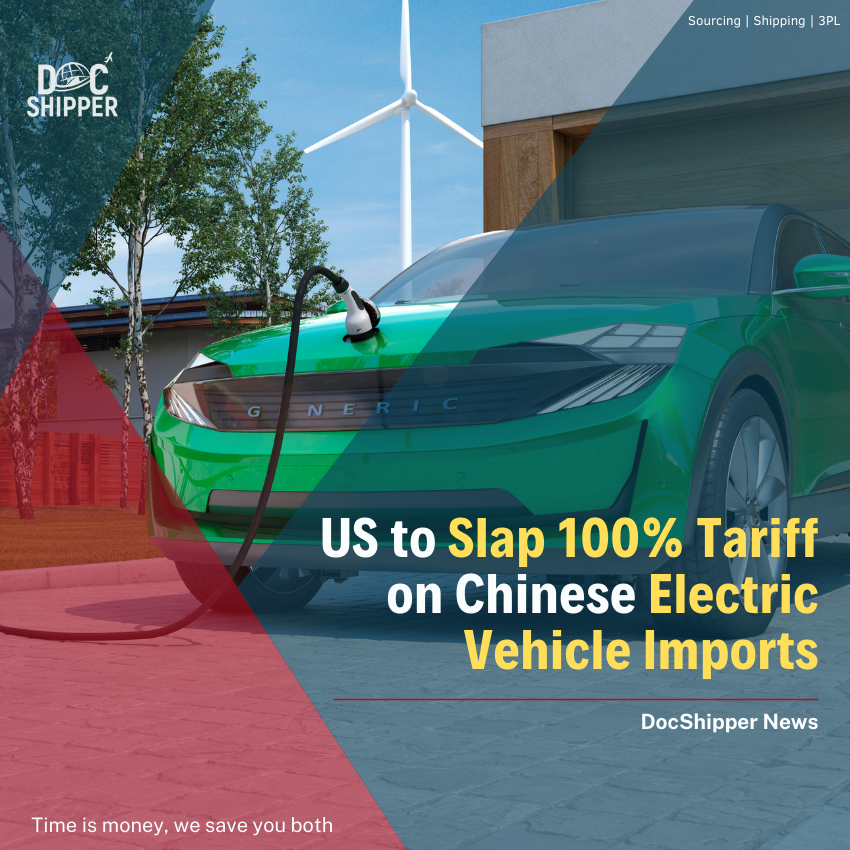Table of Contents
The trade war between the United States and China has escalated, once again as US President Joe Biden announces a significant 100% Tariff rise on Chinese Electric Vehicle Imports. This move is part of a larger package of measures aimed at protecting US Local manufacturers from the influx of cheap imports from China, sparking concerns about heightened trade tensions between the two economic giants.Let's delve into the impact and implications of this White House levy, which targets Chinese goods worth $18 billion, and discover its fallout on the international trade industry between China and the USA.
The new US tariff on Chinese Electric Vehicle Imports
The increase in tariffs on Chinese goods, including a 100% border tax on electric cars, is a strategic response by the White House to address unfair trade policies and safeguard US jobs. As tensions escalate between the US and China, these tariff hikes are viewed as symbolic measures aimed at bolstering support during a challenging election year. Analysts suggest that the tariffs serve as a political tool to shore up votes rather than having a substantial economic impact, as they follow a pattern of trade disputes between the two nations.
Despite a 27.5% tariff on most EV imports from China, U.S. electric vehicle imports from China surged from $7.2 million to $388.8 million during 2018–23, though still representing only 2% of U.S.EV imports.
The impact of new US tariffs on Chinese electric vehicles
 The substantial 100% tariff imposed by President Biden on Chinese-made electric vehicles is part of a broader effort to shield US manufacturers from the impact of low-cost imports. This move, following a meticulous four-year review, seeks to address the issue of heavily subsidized Chinese goods flooding the American market and potentially hindering the growth of the domestic green technology sector. The escalation of tariffs on EVs, lithium batteries, critical minerals, solar cells, and semiconductors underscores the administration's determination to promote a level playing field for American producers.
The substantial 100% tariff imposed by President Biden on Chinese-made electric vehicles is part of a broader effort to shield US manufacturers from the impact of low-cost imports. This move, following a meticulous four-year review, seeks to address the issue of heavily subsidized Chinese goods flooding the American market and potentially hindering the growth of the domestic green technology sector. The escalation of tariffs on EVs, lithium batteries, critical minerals, solar cells, and semiconductors underscores the administration's determination to promote a level playing field for American producers.
Electric car sales in 2023 were 3.5 million higher than in 2022, representing a remarkable 35% year-on-year increase
Importance of the US market for Chinese exports
The announcement of these tariffs highlights the significant role that the US market plays in China's export strategy. With the imposition of stricter curbs on Chinese goods, particularly in the electric vehicle sector, China may face challenges in accessing a crucial market for its products. The tariffs indicate the US government's efforts to reduce China's overcapacity in certain industries and protect its own manufacturing sector from unfair competition, underscoring the economic interdependence and rivalry between the two global economic powers.
In 2023, nearly 60% of new electric car registrations occurred in China, followed by just under 25% in Europe, and 10% in the United States. These three regions combined accounted for nearly 95% of global electric car sales!
Impact on container prices

The surge in tariff on Chinese Electric Vehicle Imports may have a significant impact on container prices, potentially leading to fluctuations in transportation costs for businesses importing goods from China to the US. As the trade war escalates, changes in tariff rates can disrupt supply chains, increase shipping expenses, and influence container pricing dynamics. These tariff hikes could result in higher overall costs for importing goods, affecting pricing strategies and supply chain management for businesses reliant on Chinese imports.
Key figures: current price of a 40' HQ container from China
The current price of a 40' HQ container from China is a crucial economic indicator, reflecting the costs associated with shipping goods from China to the US. As of the latest data, the price of a 40' HQ container from China varies depending on the condition and location, for instance :
- New 40' HC containers typically cost between $3,600 - $4,700 per unit.
- Used cargo-worthy 40' HC containers cost around $1,350 - $2,600 per unit, depending on the exact condition.
- The average price of a used 40' HC container is around $1,904, while a new one costs around $3,706 on average.
- Prices can fluctuate based on supply and demand in China.
With this being said , you need to undrestand that this figure serves as a key metric for evaluating the cost-effectiveness of importing goods from China amidst changing trade dynamics and tariffs.
Comparison with previous months’ prices
Comparing the current price of a 40' HQ container from China with previous months' prices offers valuable insights into trends in shipping costs and international trade. By analyzing fluctuations in container prices over time, businesses can assess the impact of changing market conditions, such as trade policies and tariffs, on transportation expenses. Understanding how the current price compares to historical data can help businesses anticipate and adapt to potential changes in import costs and logistics operations.
DocShipper Advice : Are you feeling perplexed or anxious about the constant changes and fluctuations in container tariffs and importations conditions ? Fear no more! DocShipper, your 360° logistics expert, is here to guide you through the entire supply chain from A to Z. Our experienced agents will handle every detail, from supplier sourcing to container shipping and pricing, all the way to door-to-door delivery. Need extra help? Contact us now for a quote!
Impacts on shipping industry
The ramping up of tariff on Chinese Electric Vehicle Import, including electric cars, solar panels, and steel, can significantly impact the shipping industry as it may lead to a detour of containers originally destined for Europe to the USA. This redirection of trade routes could disrupt established supply chains and logistics operations, causing delays and congestion in shipping routes. Additionally, the increased tariffs could result in higher shipping costs for businesses transporting goods between China and the US, affecting the competitiveness and profitability of the shipping industry.
Detour of containers destined for Europe to the USA

The escalation of tariffs on Chinese goods could lead to a detour of containers originally intended for Europe to the USA, as businesses seek alternative markets to avoid punitive tariffs. This redirection of trade routes may result in increased congestion at US ports and a shift in shipping patterns, impacting the efficiency of supply chains. The diversion of containers to the USA could create some serious supply chain disruptions and lead to logistical challenges for businesses trading between China, Europe, and the USA.
Impact on delivery times and shipping costs
The detour of containers from Europe to the USA due to heightened tariffs may result in longer delivery times for goods as companies navigate new shipping routes and port congestion. This delay could affect the timeliness of product arrivals and potentially impact customer satisfaction. Moreover, the increased shipping distances and changes in shipping patterns could lead to higher shipping costs for businesses, adding financial pressure and operational challenges to supply chain management.
Consequences for European companies
The imposition of higher tariffs on Chinese goods could have ripple effects on European companies, leading to longer production and delivery times due to potential disruptions in the global supply chain. European businesses reliant on imports from China may face challenges in sourcing essential components and products, impacting their ability to meet consumer demand. Moreover, the uncertainty over future costs associated with the surge of tariff on Chinese Electric Vehicle Imports and trade tensions could hinder strategic planning and investment decisions for European companies, creating a challenging operating environment.
Longer production and delivery times
The disruptions caused by the detour of containers to the USA could translate into longer production and delivery times for businesses across industries. Delays in receiving essential components and raw materials from China, as well as extended shipping routes, may lead to bottlenecks in production processes and inventory management. The prolonged delivery times could also impact the overall efficiency of operations, affecting businesses' ability to meet market demands and fulfill orders in a timely manner.
Uncertainty over future costs

European companies are likely to face heightened uncertainty over future costs as a result of escalating trade tensions and the imposition of higher tariff on Chinese Electric Vehicle Imports. The fluctuating trade landscape and evolving regulatory environment may introduce additional complexities and risks for businesses, making it challenging to forecast expenses accurately. This uncertainty can impact investment decisions, supply chain strategies, and pricing models for European companies, forcing them to adapt to an uncertain and volatile trade environment.
Docshipper Alert: At DocShipper, we help you navigate these uncertainties with our reliable shipping services. Our tried-and-true methods reduce supply chain risks and increase results. From risk assessment to compliance management, we ensure smooth shipping operations. Contact us now to mitigate risks and enjoy worry-free delivery with DocShipper.
Major Players Affected by Rising Chinese Import Costs in the USA
Big Shipping companies : CMA CGM, MSC Mediterranean Shipping Company, A.P. Moller - Maersk
The major shipping lines such as CMA CGM, MSC Mediterranean Shipping Company, and A.P. Moller - Maersk play a pivotal role in global trade, connecting various regions and facilitating the transportation of goods between countries. These shipping giants are instrumental in driving up prices in the shipping industry due to their extensive networks, large fleet sizes, and significant market presence. Their operational efficiency, scale of operations, and strategic partnerships contribute to influencing shipping costs and container prices in the international trade landscape.
Role of these companies in driving up prices
CMA CGM, MSC Mediterranean Shipping Company, and A.P. Moller - Maersk, as key players in the shipping industry.They have a substantial influence on driving up prices due to their dominance in global shipping routes and their ability to control capacity and demand. These major shipping lines' market power and strategic positioning enable them to dictate freight rates, which can have a direct impact on container prices for businesses importing goods from China. By leveraging their market share and operational capabilities, these companies play a crucial role in shaping pricing dynamics and cost structures in the shipping sector.
Solutions and alternatives
To manage the impact of escalating tariffs, European companies can explore diversifying their supply chains by sourcing goods from alternate markets not affected by the trade disputes between the US and China. Seeking out local or regional suppliers can provide a buffer against increased costs and uncertainties stemming from heightened trade tensions. Additionally, implementing efficient inventory management strategies and optimizing production processes can help mitigate disruptions and minimize the financial impact of tariff hikes on European businesses.
Advice for European companies on how to manage this crisis
European companies facing the challenges of increased tariffs can consider :
- Renegotiating contracts with suppliers to share or absorb additional costs resulting from the tariff hikes,
- Developing contingency plans,
- Conducting thorough risk assessments helps anticipate supply chain disruptions and higher costs,
- Collaborating with industry associations and governmental bodies to advocate for trade policy reforms or tariff exemptions can be a strategic approach for European companies navigating the impact of heightened trade tensions.
Possible alternatives (other routes, other means of transport)
In light of the rising tariffs on Chinese goods, European companies can explore alternative transportation routes and modes of transport to mitigate the effects of increased shipping costs and disruptions in global trade. Considering sea-air or rail options as alternatives to traditional shipping methods can offer more cost-effective and efficient transport solutions. Leveraging digital platforms and logistics technologies to optimize supply chain visibility and identify alternative trade routes can help European businesses adapt to changing trade dynamics and alleviate the financial strain of heightened tariffs.
DocShipper info :With DocShipper's assistance, learn about the most recent market trends and profitable shipping techniques in the ever-changing container shipping industry. Our proficiency and background in international logistics enable companies to effectively manage the intricacies of the container shipping sector and capitalize on expansion prospects. Do not hesitate to contact us; you will have a free quote in no time.
Conclusion
Biden's tariff hikes on Chinese goods, like electric cars, solar panels, and steel, respond to unfair trade practices and aim to protect US jobs. These measures symbolize a shift towards protectionism, sparking tensions with China and global trade concerns amidst a complex economic landscape.
In this ever-changing international trade environment, DocShipper’s expertise in shipping and logistics services can help you navigate these challenges with ease. Contact us today for seamless, reliable solutions tailored to your needs!
FAQ | US to Slap 100% Tariff on Chinese Electric Vehicle Imports
What is the reason behind US President Joe Biden's decision to ramp up tariffs on Chinese-made electric cars, solar panels, steel, and other goods?
President Biden increased tariffs on Chinese goods like electric cars and steel to counter unfair trade practices and protect US jobs. The aim is to level the playing field for American manufacturers and strengthen domestic industries.
How has China responded to the tariff hikes imposed by the Biden administration?
China opposed the Biden administration's tariff hikes, calling them unfair and harmful to international trade. In response, China announced plans for retaliatory measures. These actions are expected to escalate tensions and complicate trade relations between the two countries.
How do analysts view the impact of the tariffs on Chinese goods announced by the Biden administration?
Analysts view the Biden administration's tariffs on Chinese goods as primarily symbolic, designed to appeal to voters during a contentious election year rather than significantly impacting economic policies toward China.
DocShipper info: Do you like our article today? For your business interest, you may like the following useful articles :
DocShipper Advise : We help you with the entire sourcing process so don't hesitate to contact us if you have any questions!
- Having trouble finding the appropriate product? Enjoy our sourcing services, we directly find the right suppliers for you!
- You don't trust your supplier? Ask our experts to do quality control to guarantee the condition of your goods!
- Do you need help with the logistics? Our international freight department supports you with door to door services!
- You don't want to handle distribution? Our 3PL department will handle the storage, order fulfillment, and last-mile delivery!
DocShipper | Procurement - Quality control - Logistics
Alibaba, Dhgate, made-in-china... Many know of websites to get supplies in Asia, but how many have come across a scam ?! It is very risky to pay an Asian supplier halfway around the world based only on promises! DocShipper offers you complete procurement services integrating logistics needs: purchasing, quality control, customization, licensing, transport...
Communication is important, which is why we strive to discuss in the most suitable way for you!






